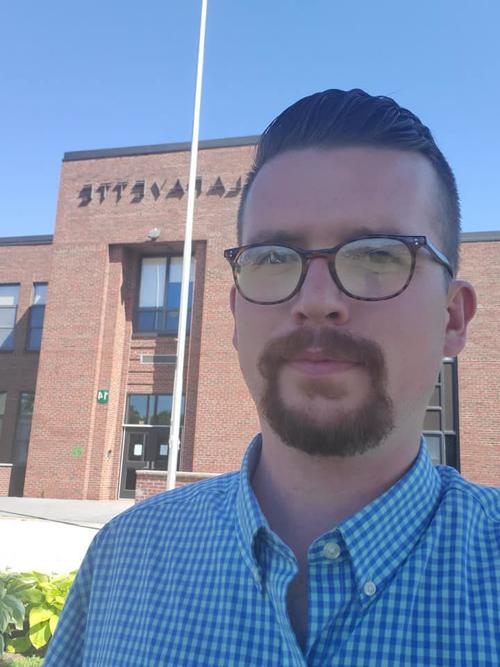
Mayor G. Frederick Robinson has announced his retirement. (James A. Parcell/The Washington Post)
Mayor G. Frederick Robinson has led Bowie for the past two decades, as the Maryland city has rapidly grown and diversified. Now, a wealthy business owner, a well-connected Annapolis lobbyist and a veteran of the city council are the leading candidates vying to replace Robinson as the next mayor of Prince George’s largest city.
Ahead of the Nov. 5 election, discussion has centered on the future of development in this municipality, where steady growth has come with a backlash, and where familiar divisions between progressives and establishment Democrats are emerging.
Business owner Timothy Adams is shoring up support among young progressives, while longtime lobbyist Leonard Lucchi has Robinson’s endorsement and the backing of a host of politicians, and Dennis Brady, who served for 22 years on the council, is counting on core supporters who have backed him over the course of 11 campaigns.
“This is a crucial time for the city,” said Adams, who has lived in Bowie for 25 years. “People feel like the city is ruled more by politics than by common sense . . . a lot of people think lobbyists and developers are taking over all the influence.”
Adams, a disabilities advocate who started Systems Application & Technologies in 1989, would be the first black mayor of Bowie, which in the 1960s was a predominantly white bedroom community and is now a city of nearly 60,000 that is 53 percent black and 36 percent white.
He said the most recent example of overdevelopment — and residents’ resistance to it — is the fight against a developer’s plan to turn Freeway Airport into more than 500 townhouses. The county council paved the way for the project with a text amendment that changed how the land was zoned, a decision that Adams said he opposed.
Adams’s critics say he is simply looking for another race to run following an unsuccessful bid for state Senate last year in which he loaned himself $475,000. He said he is focused on building a grass-roots effort, buoyed by young liberal politicians including the vocal minority block of the county’s school board that clashed with Lucchi, the board’s former lawyer.
Lucchi, a partner at O’Malley, Miles, Nylen & Gilmore, has connections with a host of politicians through his lobbying work in Annapolis. His donors include former Maryland governor Martin O’Malley (D), former Prince George’s county executive Rushern L. Baker III (D) and state Sens. James C. Rosapepe and Melony G. Griffith, both Democrats from Prince George’s.
His firm has represented the city of Bowie since 2009. Its contract this year was for $52,000, said Assistant City Manager Daniel Mears. Some critics have questioned whether Lucchi should have kept his contract with the city while he campaigns and whether he is too connected with the political establishment.
Adams said he thinks the city needs a “political outsider” like himself, and Brady said he “absolutely” thinks Lucchi and others should be barred from running for public office while they hold contracts with the city.
But Robinson, who announced his retirement this spring, said Lucchi is the candidate with the best chance of maintaining Bowie’s financial stability and bringing people together.
“He knows everybody,” said Robinson, who has campaigned on behalf of Lucchi. “If you like what I’ve done in the city, then you’ll like Len.”
Robinson said city staff determined that Lucchi’s mayoral bid did not pose a conflict of interest.
“If he were to be elected mayor, that would probably be an issue at that time,” said Mears, noting that the ethics ordinance applies to elected officials.
Michael Lord, executive director of the State Ethics Commission, said regulations bar lobbyists from fundraising for candidates for state offices, but that exemptions exist when lobbyists are fundraising for themselves.
Lucchi, a civic activist whose family moved to Bowie when he was 4, said he does not see his lobbying work as an issue and would “certainly” stop working as the city’s lobbyist if he were to win.
He said he was proud of his lobbying, including working with the state delegation to secure funding for the city’s 911 call center and a senior center. Lucchi said he wants to focus on preserving the quality of life in Bowie’s existing neighborhoods and perhaps turning its oldest section into an arts and entertainment district.
Brady, who has publicly criticized the role of developers in local politics, said that he would be an advocate for smart growth if elected and would avoid some of the suburban sprawl that he said has characterized recent development. Brady has organized a grass-roots group against the proposed maglev train project because he worries about its economic feasibility and effect on private property and park land.
He unsuccessfully challenged Robinson in 2015, winning 2,093 votes compared with 4,164 for Robinson.
Local offices in Bowie are nonpartisan. The six council member seats will also be up for election on Nov. 5, and 17 candidates have filed to run for those offices. Candidates have until Oct. 4 to register.
Adams, Lucchi and Brady say Bowie should have more say about zoning and planning in its city limits, which is controlled by the county.
Keith Jackson, who unsuccessfully ran for mayor in 2015, also has filed as a candidate. He did not respond to requests for comment.
Read more:
‘White Women Yoga’: How Bowie woman’s Meetup experiment exploded on the Internet
Politics, trash and fiscal realities collide in Prince George’s County
Local newsletters: Local headlines (8 a.m.) | Afternoon Buzz (4 p.m.)
Like PostLocal on Facebook | Follow @postlocal on Twitter | Latest local news


